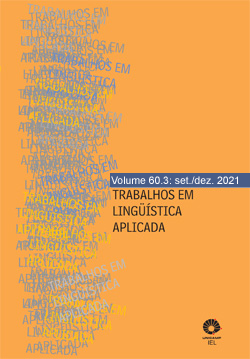Abstract
This paper aims the characterization of the literary literacy practices performed on the first day of the soiree workshop lead by Coletivoz Sarau de Periferia, in June 2017, at the Urucuia Cultural Center. This Collective, founded by the poet Rogerio Coelho, was born in 2008, inspired by the Cooperifa Soiree of São Paulo, thus linking itself to the movement and scene of marginal literature of São Paulo´s periphery. The workshop is part of the Project Coletivoz Soirees, directed to public school students, with the aim of encouraging literary reading and creative writing through the poetic performance that circulates at the perpheric soirées of contemporary marginal literature. Through participant observation and audio recording some actions, discussions and lines of the students and oficineiros were analyzed. The concepts of literacy practices (STREET, 2014), literary literacy (PAULINO e COSSON, 2009) and reexistence literacy (SOUZA, 2011) constitute the theorerical basis of the discussion. It was observed that the events and the workshop literacy practices are characterized by the interaction of the ritual formula of the soirees in the peripheries with the ones of the schools, incorporated in the participants and recreated in these meetings outside the bars and the educational institutions. In this interaction, it is created for the school a possibility to revisit its literacy pratices, broadening its repertoire, reviewing its methodology and in addition it contributes to its literary literacy practices of reexistence.
References
BHABHA, Homi (1994). El lugar de la cultura. Buenos Aires: Manantial.
CAZDEN, Courtney. et al. (1996). A Pedagogy of Multiliteracies: Designing Social Futures. Harvard Educational Review, v. 66, n.1, p. 60-92, Spring Disponível em: http://newarcproject.pbworks.com/f/Pedagogy+of+Multiliteracies_New+London+Group.pdf. Acesso em: 14 jul. 2021.
COELHO, Rogério Meira. (2017). A palavração: atos político-performáticos no Coletivoz Sarau de Periferia e Poetry Slam Clube da Luta. Dissertação de Mestrado em Artes da Cena. Escola de Belas Artes, UFMG, Belo Horizonte.
COELHO, Rogério Meira. (2015). Projeto Coletivoz Oficinas de Saraus. Fundação Municipal de Cultura. Edital Descentra Cultura.
DELEUZE, Gilles. (1970). Trad. Equipo Editorial Cactus. En medio de Spinoza. Buenos Aires: Cactus, 2003.
DIONÍSIO, Ma.Lou.A. (2000). A construção escolar de comunidades de leitores. Leituras do livro de Português. Coimbra: Almedina.
FÉLIX, Camila. (2018). Atlas dos Saraus: mapeamento dos saraus de poesia da região metropolitana de Belo Horizonte. Monografia em Arquitetura e Urbanismo. Faculdade de Arquitetura e Urbanismo, UFMG, Belo Horizonte.
MACHADO, Dione; OLIVEIRA, Karine (org.). À luta, à voz. Coletivoz Sarau de Periferia – Coletânea Poética. Belo Horizonte: Venas Abiertas, 2018.
NASCIMENTO, Érica Peçanha do (2006). Literatura marginal: os escritores da periferia entram em cena. Dissertação de Mestrado em Antropologia Social. Faculdade de Filosofia, Letras e Ciências Humanas, Universidade de São Paulo, São Paulo.
NASCIMENTO, Érica Peçanha do. (2011). É tudo nosso! Produção cultural na periferia paulistana. Tese de Doutorado em Antropologia Social. Faculdade de Filosofia, Letras e Ciências Humanas, Universidade de São Paulo, São Paulo.
OFICINAS (2021). In: CENTRO DE REFERÊNCIAS EM EDUCAÇÃO INTEGRAL. Glossário. Disponível em: http://educacaointegral.org.br/glossario/oficinas/. Acesso em: 12 jul.jul. 2021.
PAULINO, Graça. (1998). Letramento literário: cânones estéticos e cânones escolares. Caxambu: ANPED. (Anais em CD ROM).
PAULINO, Graça e COSSON, Rildo. (2009). Letramento literário: para viver a literatura dentro e fora da escola. In: ZILBERMAN, Regina e RÖSING, Tania M.K. (Orgs.) Escola e leitura: velha crise. Novas alternativas. São Paulo: Global.
PAVIANI, Neires Maria Soldatelli e FONTANA, Niura Maria. (2009). Oficinas pedagógicas: relatos de uma experiência. Conjectura, Caxias do Sul, v. 14, n. 2, p. 77-88.
REYES, Alejandro (2013). Vozes nos porões. A literatura periférica/marginal do Brasil. Rio de Janeiro: Aeroplano.
SOUZA, Ana Lúcia Silva. (2011). Letramentos de reexistência: poesia, grafite, música, dança: hip-hop. São Paulo: Parábola Editorial.
STREET, Brian e CASTANHEIRA, Maria Lúcia. (2014). Glossário Ceale. In: Glossário Ceale: termos de alfabetização, leitura e escrita para educadores. Isabel Cristina Alves da Silva Frade, Maria da Graça Costa Val, Maria das Graças de Castro Bregunci (orgs). Belo Horizonte: UFMG/Faculdade de Educação. Disponível em: http://www.ceale.fae.ufmg.br/app/webroot/glossarioceale/verbetes/praticas-e-eventos-de-letramento. Acesso em: 12 jul.2021.
STREET, Brian (1996). Letramentos Sociais: abordagens críticas do letramento no desenvolvimento, na etnografia e na educação. São Paulo: Parábola Editorial, 2014.
TENNINA, Lucía (2017). Cuidado com os poetas! Literatura e periferia na cidade de São Paulo. Porto Alegre: ZOUK.

This work is licensed under a Creative Commons Attribution 4.0 International License.
Copyright (c) 2021 Trabalhos em Linguística Aplicada


